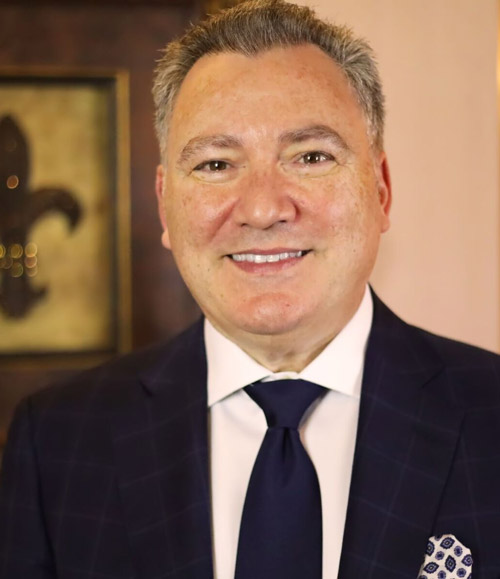Dental Implant Restoration
Missing teeth are cute on kinds but not so much on adults. Dental implants are the best way to replace missing teeth and get a beautiful and natural looking smile.
(504) 368-7000
Dental Implants
We take great care to focus on even the smallest design details of your crown, bridge or denture, to make it look as much like your biological teeth as possible. The restorations are made of cutting-edge materials that reflect light much in the same way that natural tooth enamel does. Furthermore, they can be tailored to match the shade of your current smile or improve on it, if you wish.
As noted above, dental implants can be used to secure a crown to replace a single missing tooth, a dental bridge to fill in a gap of several absent teeth or a denture to restore an entire missing arch of teeth. Therefore, dental implants are used in a variety of scenarios. When you have biological teeth remaining in your smile, we take great care to match your restorations to those teeth so that the restorations do not stand out noticeably from the rest of your smile.
As the patient, you have a significant amount of input into the design of your restoration.
Your dentist will work closely with you to choose the characteristics of your crown, bridge or denture, especially the shade of the prosthetic appliance. It’s important that the patient is comfortable with the appearance of the appliance, as it is intended to last for decades. If you have any concerns about the way your implant-supported crown, bridge or denture looks, be sure to discuss them with us so that we can address them or make adjustments to the restorationsas needed.
Typically, the osseointegration of the dental implant must be complete before a permanent restoration is placed on the implant. However, depending on the circumstances, some patients may be able to be fitted with a temporary restoration at the time the implant is placed. Your dentist will collaborate closely with your surgeon on the timing of the restoration, in addition to consulting on any aspects of the surgical process that may affect the restoration.
New Orleans Dentists

Dr. Michael Rouhana
DDS
Dr. Rouhana is experienced in the fields of root canals, crowns (caps), bridges, restoration of dental implants, dentures and partials, and full mouth makeovers. He was voted the 2009, 2010 and 2011 Top Dentist by his peers in New Orleans Magazine. Read More
At Westside Dental Group, Dr. Michael Rouhana has dedicated his career to providing you with the very best that dentistry has to offer in a gentle, professional manner.
Our practice has been in the same location in New Orleans, Louisiana for over 20 years, and we keep entire families as patients through many generations!
Common Questions On Dental Implants
Most frequent questions and answers
A dental implant is a small cylinder that is made of titanium, a metal that is biocompatible. That means that the surrounding bone is able to form a bond with the metal, rendering the implant as a permanent fixture in the mouth. A dental implant is essentially an artificial tooth root, and it is inserted into the jaw in a surgical procedure. After the dental implant has been osseointegrated, it can support a permanent restoration of some sort, whether that is a single crown or a dental bridge or denture. In many cases, patients can be fitted with temporary appliances immediately after the implant is placed.
The most important consideration for long-term dental implant success is the quality of bone available at the implant site. If there is inadequate bone, then the bond between the bone and the implant may not be strong enough, and the implant can fail prematurely. Because bone loss occurs over time after tooth loss, patients who delay dental implant placement may find that their jaw has eroded too much in the area to support a dental implant. If this occurs, you may not be an immediate candidate for dental implant placement. However, preliminary bone grafts can help to make the implant site more suitable in cases of bone loss. If you want to avoid the additional procedure, though, you should pursue dental implant placement soon after your biological tooth is removed.
Generally, the osseointegration process should be complete before the patient is fitted with a permanent restoration. This process unfolds over the course of several months, although there can be some variation from patient to patient. Your dentist and oral surgeon can tell you what sort of a timeframe might be expected in your case. Certain patients may be able to wear a temporary appliance that is fitted on the day the dental implant is placed. If this is the case, your oral surgeon and dentist will collaborate on treatment planning and the timing of that temporary restoration.
There is no one answer to the question of costs associated with implant restoration. It varies on a case-by-case basis. The types of materials used in the restoration, along with any auxiliary treatments, will influence the cost. Your dentist can give you more specifics about the anticipated costs at your evaluation.
After you’ve suffered tooth loss, you likely will want the most aesthetically pleasing restoration possible, with emphasis on a natural look that fits in seamlessly with the rest of your smile. We can help you to achieve that goal. If you are considering dental implants, schedule an appointment at our office to get started on your path to a lifelike restoration.
